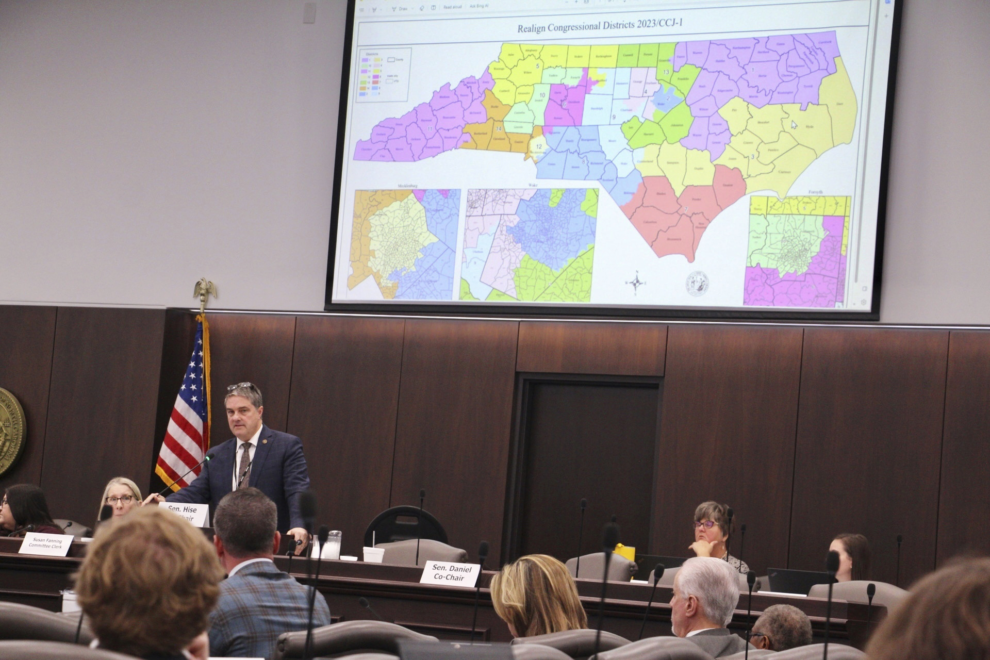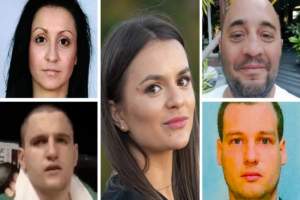Candidate filing for North Carolina elections next year opened on Monday with races for governor and several statewide positions without incumbents expected on the ballot, along with contests for all U.S. House and legislative seats, altered yet again by redistricting.
Filing started at noon with the State Board of Elections in Raleigh for statewide, federal and judicial offices and at county election board offices for other positions.
Within a half-hour, more than 50 people — candidates, their staff and family members — were waiting to enter a building at the State Fairgrounds to turn in paperwork and filing fees. Those coming to Raleigh to file early included U.S. Rep. Chuck Edwards, repeat congressional hopeful Bo Hines and labor commissioner candidates Jon Hardister and Luke Farley.
“It’s really an honor and a privilege to have this opportunity,” said Kaleb Wingate, a District Court judge in seven far western counties running for a second four-year term. He was the first candidate to complete the filing process with the state board, waiting outside the fairgrounds building since 9:30 a.m.
“We take it very serious and want … to be ready to go when the time comes,” Wingate said.
Filing ends at noon Dec. 15 for candidates seeking party nominations in the March 5 primaries. Those unopposed for a nomination skip to the November general election. Independent candidates have more time to collect signatures to get on next fall’s ballot.
The 2024 elections should result in a shakeup at the top of the executive branch. Six of the 10 incumbents on the Council of State aren’t seeking reelection to their current positions.
Term limits bar Democratic Gov. Roy Cooper from running for another four-year term, and current Republican Lt. Gov. Mark Robinson, Democratic Attorney General Josh Stein and Republican State Treasurer Dale Folwell are among the announced candidates seeking to succeed him. That means their positions also will be open.
State Auditor Beth Wood and Labor Commissioner Josh Dobson aren’t seeking reelection as well. Wood is resigning next week, and Cooper’s choice to finish out her term, Jessica Holmes, filed on Monday to run for auditor in 2024.
“There’s some open seats on various levels of state government and in local government, so it is a big day and we’ve prepared for a big turnout,” state board Executive Director Karen Brinson Bell said. Candidates also are filing for the state’s 14 U.S. House seats and 170 General Assembly seats.
Democrats and Republicans currently hold seven congressional seats apiece in the state. But the GOP-controlled legislature redrew in October the map so it could give Republicans at least three more seats after 2024 at the expense of incumbent Democrats, according to election data.
One of the three — first-term Rep. Jeff Jackson of Charlotte — already announced that he’s running for attorney general. The lines also could make it very hard for Democratic Reps. Kathy Manning of Greensboro and Wiley Nickel of Cary to return to Capitol Hill in 2025. The state House and Senate districts also were redrawn several weeks ago, putting Republicans in a strong position to retain control of both chambers through the rest of the decade and potentially maintain their veto-proof majorities.
Two years ago, the state Supreme Court suspended 2022 candidate filing after three days so courts could review lawsuits claiming illegal gerrymandering. Filing resumed 2 1/2 months later, after North Carolina’s congressional district lines had been redrawn twice and General Assembly boundaries once, and the primary was delayed until May.
So far, there are two lawsuits challenging this fall’s redistricting, including one filed late Monday by Black and Latino voters seeking to block the state’s new congressional map. They say the map illegally weakens minority voting power. A federal judge already refused to expedite action in an earlier lawsuit that focused on some state Senate districts.
Candidates this year also are vying next year for one seat on the state Supreme Court, three on the Court of Appeals and hundreds of trial court judgeships and local positions.
Voters also will cast primary ballots for president March 5, but those candidates don’t file. Rather, the state board finalizes this month those names based on directions from those parties who hold primaries — the state Democratic, Republican, Libertarian and Green parties.
Source: The Charlotte Observer










